Sober Kids Canada
For Parents
Alcohol – Questions and Answers
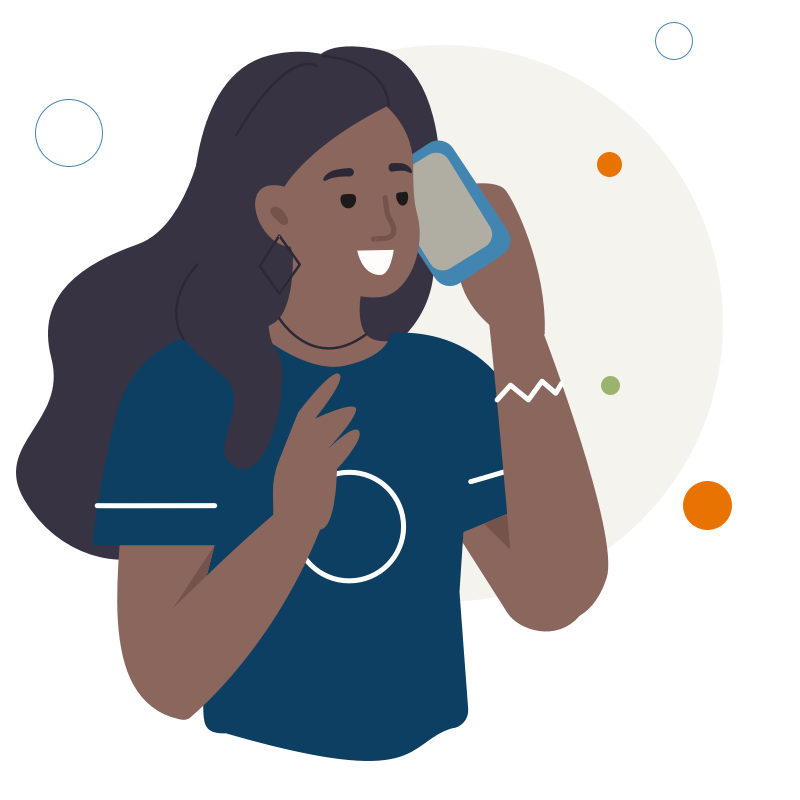

Is it common for a teen to drink alcohol?
Alcohol is the most commonly used harmful substance by teens in Canada. As of 2019, over 1 million youth ages 15-19 consumed alcohol annually. Also, the most common age for Canadian teens to consume first drink alcohol is age 13. Teen alcohol consumption also accounts for an alarming percentage of overall alcohol sales. In the US, over the last decade, underage drinking has ranged between 10-25% of all alcohol sales.
In this regard, teen drinking is something many parents can expect. It can be ‘normal’ meaning many teens do it, but this does not mean the behaviour is OK or healthy. Normalizing this behaviour to our kids can be very dangerous because it allows us to avoid looking at the real harms drinking causes for teens in the both the short and long term.
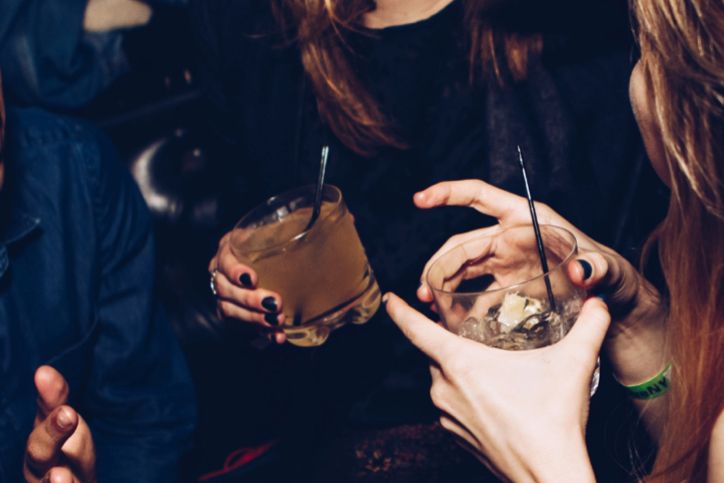
My teen is experimenting with alcohol: Should I be concerned?
If you know your teen it is experimenting with alcohol you should be concerned. Normalizing alcohol use amongst teens can lead to the following negative impacts:
- Teens who start using drugs/alcohol before age 17 are at substantially increased risk of developing long term issues with substance abuse.
- Approximately 95% of adults with long term substance abuse issues started using drugs/alcohol before the age of 17 35.
- At their younger stage of brain development, teens are much more susceptible to developing dependency on any substance (including alcohol) that alters their brain chemistry. In other words, the teen is more likely to develop a behavioural or physical addiction to a substance than someone trying a drug once as an adult.
What are the harms associated with teen alcohol consumption?
- Risk of physical harm – Yearly, alcohol consumption is the second leading cause of all teen emergency room visits/hospitalizations. The first leading cause of such visits relates to cannabis use 36 .
- Risk of violence – Youth who drink alcohol are significantly more likely to either act violently or be the victim of violence. The forms of violence range from verbal bullying to physical and sexual assault. As of 2019, One in seven (14.2%) Canadians ages 15 years and older reported experiencing verbal abuse, feeling threatened, emotional abuse or neglect, or physical abuse by another drunk individual in the past year 37 .
- Risk of injury or death by motor vehicle – Youth who drink or use drugs are at greater risk of being passengers in vehicles with drunk drivers and/or driving drunk themselves. These teens thus face a much greater risk of death than their non-drinking peers. Motor vehicle accidents are a leading cause of death among Canadians ages 16 to 25, with up to 55% of these accidents involving alcohol 38 .
- Poor school performance/bad future – Research in Canada shows that students who binge drink are much more likely to have lower grades in school, to put less value on education/the future. In other words, students who binge drink are much more likely to do poorly in the future compared with students who do not binge drink 39 .
- Risk of addiction/dependence as an adult – Approximately 95% of adults with long term substance abuse issues started using drugs/alcohol before the age of 17. Generally, teens who use alcohol are at a much greater risk of developing long term drug or alcohol dependence as an adult. Due to differences in how these substances are absorbed and metabolized, youth can experience more pleasurable effects than adults, such as increased sociability and desire to engage in risky behaviours. Conversely, teens have less negative physical aftermath (hangovers, etc.) than adults who drink. These factors leave youth at an increased risk of continuing to use these substances to deal with the stresses/strains of being a teenager, which can create on ongoing cycle of dependence on alcohol into their adult years. In other words, teens who drink increase significantly increases their risk of being alcoholics as adults.
Why do Canadian teens drink alcohol?
There are a number of different reasons why teens drink alcohol:
- Friend group is using/desire to fit in – one of the most common reasons teens use marijuana is because their friend group starts using it. To a teen, fitting in can be one of the most important things in the world. If the group they hang out with are using weed, it will be almost impossible for your teen to say no when offered to use by a friend.
- To deal with the normal stresses of being a teenager – Many teens use alcohol because it allows them to deal with the normal stress and pressure that goes along with the natural process of the brain learning to process emotion and develop. Unfortunately, using alcohol or any other drug can stunt this normal process of brain development.
- Trauma – many young people who have experienced trauma (physical, emotional or sexual abuse) are more likely to turn to alcohol/drugs as a way of numbing this terrible experiences.
- Genetic factors and mental illness – Teens in a family with a history of addiction are 50% more likely to abuse substances such as alcohol. Further, teens who suffer from psychiatric disorders (depression, ADHD, schizophrenia) or who come from a family where such disorders are common are at an increased risk of carrying out substance abuse 40.
- Boredom and loneliness – Kids who do not have structured activities or positive engagement with their own families are at greater risk of using drugs.
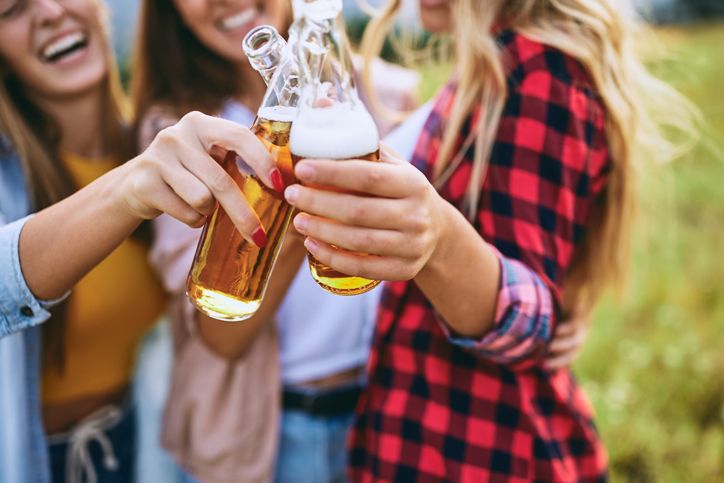
Is there any way I can guarantee my kids won’t drink alcohol?
There are no guaranteed ways parents can prevent their kids from drinking alcohol. Sometimes, even with the best of intentions and all the right tools, kids will make their own poor choices. This said, there are many things parents can do to minimize the risks their kids will use alcohol. Parents who set a good example with alcohol and who teach their kids about its harms have a better chance their kids will not use it. It is not a foregone conclusion our kids will drink, and it’s well worth the effort to try and prevent it or stop it in the early stages.
How do I talk to my kids about drugs or alcohol? Active listening and Open Communication
How do we talk to our kids about drugs? There is no guaranteed way of success to talk to your kids about drugs. But you likely cannot lecture them away from the behaviour. As most parents know, teens often recoil and shut down their listening if they feel they are getting a moralizing lecture.
A better way to approach the issue of substance use with your kids is through active listening. This is a type of listening where you, the parent, make it clear you are hearing what your child is saying, and you are making efforts to understand what they believe to be true. Acknowledging their opinion and making them feel heard and part of the conversation will likely get you further than being angry and moralizing the dangers of drugs.
Be curious, ask questions, repeat back their answers, that allow them to inform you what they believe about substance use before you convey the truth or what you believe:
Parent: I know some of your friends are drinking. What do you think about them using alcohol?
Child: Well, I don’t know, they seem to be having fun, but they act a bit weird, it was pretty funny watching them stumble around.
Parent: Why do you think the alcohol makes them stumble around? What do you think it’s doing to their brain and body to make them act like that?
Child: I don’t know, I think it just makes them act silly.
Parent: Why don’t we look up on the internet together what alcohol is doing to the brain when someone gets drunk.
Also, if our own child (or a friend) is drinking or using drugs, it is important as parents for us to not harshly criticize the person (your teen or the friend) for using drugs or alcohol, but instead to show your issue is with the behaviour. Getting angry and calling your child names (moron, stupid) for drinking/using drugs may just lead to the behaviour getting reinforced. Instead, focusing on why the behaviour is not tolerated or accepted helps kids see the behaviour as wrong, not themselves personally as ‘bad’ for doing it.
The following are some good resources on active listening:
Very Well Mind – https://www.verywellmind.com/what-is-active-listening-3024343
The Center for Parenting Education – https://centerforparentingeducation.org/library-of-articles/healthy-communication/the-skill-of-listening/
Teens can smell “BS”, know the facts about alcohol and drugs before you talk
Your ability to convey the seriousness of these issues will be much greater if you know the facts about these substances in advance of any conversations (i.e. the facts about why the substances are harmful and addictive for teens). The facts work much better than trying to scare them into stopping with moral lectures 41 .
Keeping lines of communication open constantly
Ongoing and active conversations about drugs and alcohol with your children/teens will significantly limit the chances of them developing a substance use disorder as either a teen or adult. While we may think our kids are not interested in much we have to say, many adults look back on life and give credit to their parents as to why they did not use substances as a teenager. From a young age, making it clear in a loving way you do not approve of substance use is a useful tool to preventing it. Many kids cite disappointing their parents as a big reason they do not use drugs.
If you see signs of poor mental health in your teen, get help. Talk to a family doctor, a counsellor (school or private). Youth with mental health issues are more likely to use drugs than those without these problems
Also, if you want to talk to your kids about difficult issues, it will be impossible to do unless you have built/work on building an ongoing communication about all issues in their life. Spending quality time with kids from a young age, asking questions about their lives, and showing interest in their activities will help you build a relationship of trust that lets you speak about difficult issues like substance abuse much more easily as they enter their teen years.
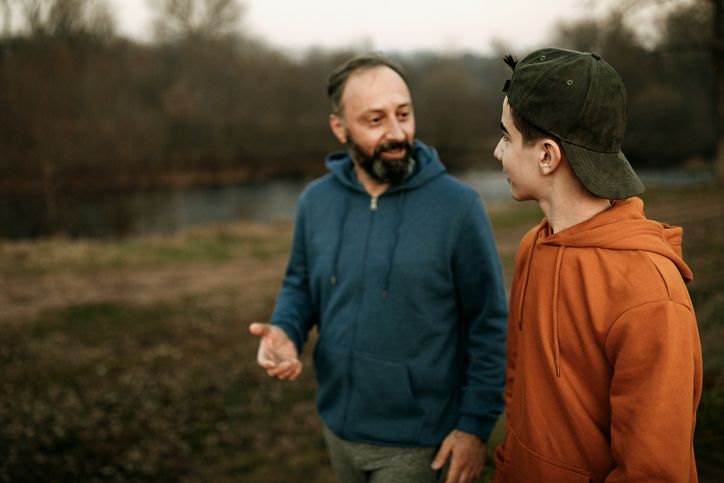
Kids drink alcohol to cope – How do we help them find better ways to cope?
So how do we help our kids cope with the strain of life? What are some things we can do to give them the tools to deal with life without using alcohol/drugs? While there is no guaranteed path to success for this for any parent or child, there are some things we can do as parents to help our kids develop healthier ways to deal with the issues that cause them to drink in the first place. Here are some suggestions on how to help your kids develop better coping strategies:
- Start and maintain a good bond of trust from an early age. Staying engaged with your child from infancy onward, spending lots of quality time together and showing interest in their activities are great ways to form a loving connection that can ward off substance abuse, and/or ensure you have an open line of communication about this issue as your child enters their teen years.
- Support and encourage activities that are structured, healthy and give a natural high – Remember that kids who are drinking are looking for a “high”, or a way to get chemical reaction in their brain that says “feel better”. Encouraging and fostering better ways to get this natural high can be helpful, such as sports, music or a healthy hobby that your child is passionate about 42 . Kids who are engaged in structured activities they are passionate about are less likely to consume alcohol.
- Teens with better coping skills and appropriate boundaries at home are less likely to use substances. Promoting self-regulation (managing their own behaviours, emotions) from a young age is important to build resilience to the challenges of life. This can be done, in part, by creating certain household routines as a regular pattern of the youth’s life (chores, cleaning their room etc) 43 . Setting appropriate boundaries for behaviour generally and teaching your kids to respect themselves and others can be just as effective at preventing substance use as any ‘don’t do drugs’ talk at school.
- Stay connected with your kids emotionally, and be open and willing to discuss their good days and bad days, particularly when they are teenagers. Be open to discussing the normal daily problems they are facing and help them with strategies of how to deal with these problems. If you earn your child’s trust, it is more likely they will talk to you about their feelings (negative and positive), and it will also be easier for you to convey strong, clear boundaries about not using drugs or alcohol 44.
- If you see signs of poor mental health in your teen, get help. Talk to a family doctor, a counsellor (school or private). Youth with mental health issues are more likely to use drugs than those without these problems.
- Youth often follow the lead of parents and siblings with respect to how to manage their emotions and whether or not to treat emotions with substances. Setting a good example for your own kids in this regard is a great way to teach them coping strategies. Learning good emotional coping yourself (if needed) through counselling, self-help or therapy will likely have positive impacts on how your own children learn to deal with emotional trials and tribulations.
- Set consistent and clear rules on the use of drugs and alcohol by your kids, and what the consequences for punishment will be if they fail to abide by these rules. Children who know in advance these clear sets of rules/consequences are less likely to use drugs than kids without such parental boundaries 45.
- Get to know your kids’ friends and the parents of the friends. Your kid is looking to friends and other adults for guidance on how to deal with life. The friends and adults she looks up to/wants to fit in with will play an important role in sending messages about how to deal with life’s problems. If the message your child is getting from either of these sources is a poor one, you may want to intervene and provide your child with the appropriate positive messaging.
- Do not adopt the parenting strategies of others just to make your child feel they fit in. You may often hear “but johnny is allowed to do this” etc. Remember the child of parents who allow poor coping strategies (such as substance abuse) is a child who is more likely to face problems for the remaining teen years and into adulthood 46.
“It’s just drinking mom, everyone does it, including most adults!” – How do we respond?
In defending their decision to drink, we as society give kids plenty of excuses to think it is OK. Most parents drink a little bit, our friends do it, people on TV do it, etc. Despite all of these outside influences, a parent can often by the most powerful voice of education in a child’s life. As a parent, you can use opportunities like this to do your best to educate your child on the realities of alcohol, why it’s illegal for kids, and why it’s not a good idea for kids to drink. You can point out the difference between healthy adult drinking and non-health adult drinking.
Some helpful talking points about educating your teen of the realities of underage drinking include the following:
- Stunting of emotional development in teens – regular use by teens stops/slows the normal process by which teens learn to emotionally react to normal life stressors. For example, if a teen uses regularly from age 12 to 17, she may then find herself trying to deal with life as a young adult having the emotional skills of a 12 year old 47. Adults brains are already largely developed, so they have a lower risk of dependence and emotional harms if they use alcohol responsibly vs. teens who drink.
- Teens who use alcohol are at a much greater risk of developing long term drug or alcohol dependence as an adult. Due to differences in how these substances are absorbed and metabolized, youth can experience more pleasurable effects than adults, such as increased sociability and desire to engage in risky behaviours. This in turn puts youth at an increased risk of continuing to use these substances to deal with the stresses/strains of being a teenager, which can create on ongoing cycle of dependence.
- Alcohol use by teens negatively impacts school performance. Generally, students who regularly use alcohol have much worse outcomes for education than those who do not drink.
- Explain the difference between normal adult drinking and abnormal adult drinking – An adult having a beer watching the football game or a glass of wine with dinner vs. an adult getting hammered and running his car into a telephone pole.
- Friendships with others based on alcohol use are superficial and lack good meaning or intimacy – entry requirements into a group of drinkers are low compared to other groups because that’s all you have in common (the alcohol use) 48.
- Alcohol is the main cause of hospitalizations for youth in Canada.
Younger kids - How old should be kids be when I start talking to them about drugs and alcohol?
There is no set rule as to when you can start talking to your kids about drugs and alcohol, but parents should look for opportunities to start these discussions during pre-teen years (8-12). Here, you can look for opportunities to discuss these subjects, possibly when your child hears about them or sees drugs or alcohol in a TV show. For example, if you are watching a movie and someone is smoking (pot or nicotine) this can be used as a time to explain what these substances are and why they are dangerous. Similarly, if your young child sees an ad for alcohol on television, this can be used as an opportunity for you to explain why people drink, the difference between grown up responsible vs. irresponsible drinking, why it is bad for kids to drink and the problems people have when they consume too much of it.
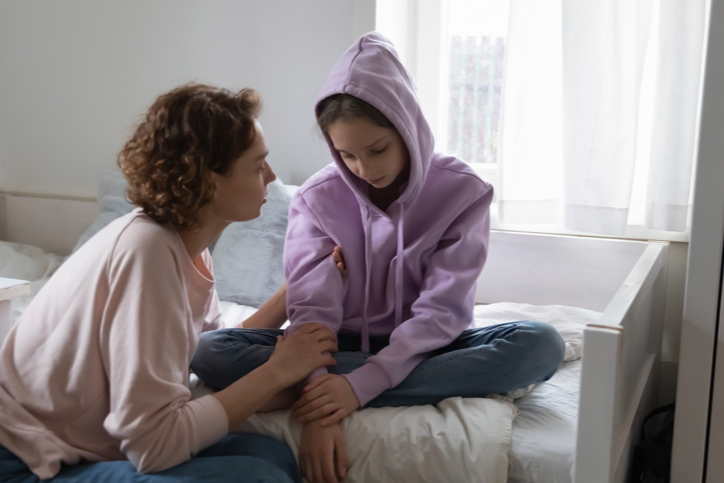
Addiction runs in our family. What are the risks to my kids?
Alcoholism and/or addiction generally often has a genetic component. In other words, if addiction runs in the family, the chances of a teen becoming dependent on substances is higher. For example, with respect to children/grandchildren of alcoholics, it is estimated that there is a 50% chance of a child inheriting the genes that contribute to this disease.
It is also important to note that even if the parent does not abuse substances, the genetic component can still be passed along to a child. For example, if your father was an alcoholic, and you as a parent never drank in your life, you can still pass along the hereditary genes which render your children more susceptible to alcoholism.
In other words, addiction is a disease that often has a genetic component. Parents should discuss these issues with their children as early as possible/as often as possible, the same as one would about any other family health condition such as heart disease or cancer 49 .
Kids often turn into their parents and friends – Impact of role models on teen drinking patterns
Role-Models have a significant impact how teens view or use substances. Teenagers (like the rest of us) often become who they hang out with or who they look up to. For example, if a parent or sibling abuses alcohol, there is a much greater likelihood the child who observes this will use harmful substances 50 . Children in such environments also are at greater risk of developing a substance abuse disorder as an adult 51 .
The same is true of teens who grow up in households where parents are OK with their kids’ using drugs or alcohol to some degree. Many parents (with good intentions) feel that it is better if their child drinks under their roof where they can keep an eye on them rather than out in public. This kind of parenting, while well meaning, can have devastating consequences in the long-term. Children who are taught it is normal or OK to use substances are at greater risk of using harmful substances and often go on to develop addiction/substance abuse disorder as an adult.
It is also important to remember that a teen’s social group is full of people who they see as role models. Kids (like the rest of us) have a drive to fit into the group and often look up to their friends. Fitting in can be the most important thing in the world in adolescence. If a teen is part of a group who is using drugs/alcohol, it will be very, very hard for her to say no when confronted with the choice whether or not to drink. Saying “no” may be the equivalent to losing her friends 52 . Research has shown time and again that the main reason kids drink is to fit in with their peer group who are also drinking.
What kind of example can I set for my kids with alcohol use?
Drinking responsibly around your kids is the best example you can set for their own future alcohol use. If kids see you drink responsibly they have a better chance of drinking responsibly in the future.
How much/how often you drink will inform your kids views on alcohol. For example, if a young child (under 5) views their father coming home from work every night and having 3 rum and cokes to relax, that same child can be imbedded with the view that alcohol is needed to relax. This same child is more vulnerable to seeing binge drinking as acceptable in the teenage years. The same could not likely be said for a child who is occasionally seeing his mom and dad drink wine at dinner.
Also, during times when you are having a drink in front of them is a good opportunity to discuss what responsible drinking is. If you are having a beer watching the football game, this is a good time to explain the difference to them between enjoying a couple of drinks at home vs. getting wasted and why the latter is poor behaviour. Also, explaining to kids the good reasons why it is illegal for them to drink is also helpful (youth brains are more easily harmed than adults by alcohol use, youth are more susceptible to addiction if they consume alcohol at a young age, etc.)
My child’s friends are drinking alcohol– What do I do?
If your child is hanging out with a group that drinks alcohol or smokes pot there is a very high chance he is also using these harmful substances. So what can you do?
Some practical tips:
- Criticize the behaviour not the person – If one of your child’s friends (or your own kid) is drinking or using drugs, it is important as parents for us to not harshly criticize the person (your teen or the friend) for using drugs or alcohol, but instead to show your issue is with the behaviour. Getting angry and calling the friend names (moron, stupid) for drinking/using drugs may just lead to the behaviour getting reinforced. Instead, focusing on why the behaviour is not tolerated or accepted helps kids see the behaviour as wrong, not themselves personally as ‘bad’ for doing it 53 .
- Set clear limits on behaviour and who your child can spend time with – State you have a no alcohol/drugs policy in the household, and that means you (the child) cannot hang out with anyone engaged in substance abuse.
- Do not normalize the behaviour – If you state things like “I know every kid experiments”, while this may be well-meaning, it can send the message that it is OK to engage in substance use 54 .
- Talk to the parent (s) of the other teen in the group you know is using drugs or alcohol. Not every parent will have the same values as you, but knowing the parents of your teen’s friends and having a relationship with them can go a long way towards knowing who your child’s friends are and what they are doing together. Further, the other child’s parents may not also be aware of their own child’s drug use and they may be just as concerned as you are if you inform them 55 .
Allowing our kids to drink alcohol at home – does this help?
Some families believe that allowing their teens to use alcohol or other drugs in moderation at home will lead to more responsible choices. While this can be a well-meaning strategy, it does not usually lead to good habits. Research shows that children who are permitted to use drugs or alcohol and/or who are exposed to parents who drink excessively have an increased likelihood of developing a substance use disorder.
It is also important to remember that during adolescence, teens’ brains are developing coping strategies to deal with the strains and trials of life. Teen often use alcohol and drugs to escape these stresses. By permitting teens to use alcohol, the message that may be sent (unintentionally) is this: you, my teen, cannot handle the stress of life, so drinking alcohol is an OK way of dealing with it.
Research shows that more effective/emotional coping strategies that teens have, the less likely they are to develop a substance abuse disorder. Conversely, kids with less robust coping strategies are at increased risk of drinking, using drugs and developing dependence on substances.
How do I know if my child has a problem with alcohol?
If several of the following factors occur at the same time, this may indicate your child has a drinking problem:
- Drastic mood swings and irritability, being overly defensive.
- Changing friend groups (changing from a group of friends you might approve of to a group you do not approve of)
- Catching your child drinking or finding alcohol in their belongings.
- Having issues at school she never had before (skipping classes, discipline issues at school, grades dropping).
- A change in motivation, giving up activities he used to enjoy, lethargic, low energy.
- Developing an attitude that she does not care about anything 56 .
I believe my child has a problem with alcohol – What do I do?
If you believe your child has or is developing an alcohol dependency, there are many resources/organizations in BC that can help. Please see our Get Help page and select your community or the community closest to you.
In addition to these resources, you can also consider the following:
- Children using alcohol is often a sign of an underlying mental health issue that is not being addressed. Teens can drink because of past trauma, to numb feelings of depression or anxiety, or because it eases a sense of social isolation. Discussing this with your child’s family doctor, school counsellor and/or engaging the services of a youth counsellor may be helpful.
- If you believe your child is dependent on alcohol, it will be appropriate for you to take care of yourself/resource yourself. Attending Al-Anon meetings (https://www.bcyukon-al-anon.org/meetings/)can be a great way to learn skills to deal with a child’s addiction/dependence. At these meetings, you can find often find other parents who are struggling with the same issues and you can learn valuable skills to help you deal with this issue.
My kid told me that a friend was drinking alcohol. What to do? Do we tell parents?
If your child tells you that a friend is drinking alcohol, first, it is helpful for you to determine why you are being told this information. This can inform your response.
- Is your child concerned about the friend?
- Is your child testing the waters to see if you are OK with underage drinking?
- In telling you this information, your child is looking for a message/guidance from you on drug use – what will your message be?
How you react might inform your teen how you really feel about underage drinking, or how you view what it really means to be someone’s friend.
If you choose to tell the other child’s parents, you may be sending positive messages to your own teen (we care about your friend, you care about your friend, we care about teens using alcohol or drugs).
In such circumstances, it will also be normal for your teen to make you promise not to tell their friend’s parents. You can respond to that kind of request by telling them a good friend is someone who looks out for their friends when they make poor decisions and tries to protect them from themselves.
If you do face this scenario, it is a great opportunity to teach your kids how to react and get medical intervention for their friend if necessary. In some instances of extreme intoxication, a friend might be facing alcohol poisoning or a drug overdose. Kids may want not want to get help for fear of getting busted themselves. Explaining to your teen that these are real life or death scenarios can be important, and encouraging them to call 911 for medical attention or taking a friend to an emergency room might save their life.
When confronted with the scenario of a friend using substances, every parent will have to determine how to react based on the circumstances. If you choose to tell another child’s parents, the reaction may be positive or negative. Some parents might be grateful you shared this information, while others may be defensive or hostile. Denial is a big part of the entire culture around teen substance use and it can be hard to break through it 57.
What if my child asks if I drank alcohol or used drugs when I was younger? What do I say?
If your child asks if you drank heavily or used drugs, there may be a reason for this question other than just innocent curiosity. This kind of question can be a sign that your child is considering drug use or has seen friends or friends’ parents take drugs or alcohol. Before you answer, it is important to try and gently determine why the question is being asked.
- What makes you ask son? Did you hear about me or someone’s parents getting drunk?
The answer you get may determine how you respond to the question. If you do have a history of using substances, there is no absolutely correct way of dealing with this question. Honesty is important with your kids as it is with any relationship. If asked this question, hopefully you can use your own experiences as way of teaching your teen what not to do.
If you did use substances, when you respond, if you want to discourage your child’s use, one suggestion will be to talk about the negative consequences of when you used substances:
- Drinking was a big part of the culture when I was young. I felt pressured and it usually made me sick the next day…one of my friends was killed by a drunk driver as a teen….”
- I smoked pot and I got really paranoid and felt afraid.
When asked these kinds of questions, directing the conversation back to your teen is important – “I want to know about you, you are the person who is important now”.
Ultimately, if you want to discourage your teens from making the same mistakes you did, it will be important to tell them that what you did was a mistake and that you would not do it again if you had the chance to go back and make different choices. Teens are often looking for others, including you, to normalize something they want to do if they are uncertain as to whether they should do it themselves 58.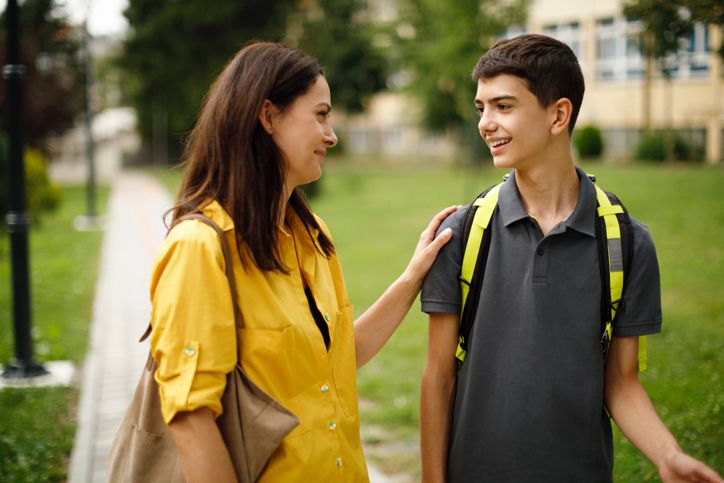
Allowing our kids to drink or use drugs at home – does this help?
Some families believe that allowing their teens to use alcohol or other drugs in moderation at home will lead to more responsible choices. Research shows that allowing kids to drink/use drugs at home can lead to problematic substance abuse.
The reasons why parents allow kids to drink at home include:
- Some parents believe their kids can drink on special occasions at home (Thanksgiving, Christmas etc.).
- Parents may also believe that by allowing their kids to drink at home they can teach them proper drinking and monitor their behaviour.
- It is also believed (erroneously) by many that all kids will drink anyway so allowing them to drink at home is a form of harm reduction 59.
Despite the good intentions of many parents in these situations, research shows that children who are permitted to use drugs or alcohol and/or who are exposed to parents who regularly drink/do drugs have an increased likelihood of developing a substance use disorder. Also, if drinking is normalized to a teen, it is more likely that teen will see underage drinking (and drinking generally) as an acceptable way to cope with life’s problems.
During adolescence, teens’ brains are developing coping strategies to deal with the strains and trials of life. Teens often use alcohol and drugs to escape these stresses. By permitting teens to use drugs or alcohol, the message that may be sent (unintentionally) is this: you, my teen, cannot handle the stress of life, so drinking/using drugs is an OK way of dealing with it.
Research shows that more effective/emotional coping strategies that teens have, the less likely they are to develop a substance abuse disorder. Conversely, kids with less robust coping strategies are at increased risk of drinking, using drugs and developing dependence on substances.
Rules of Engagement for Parents – How to prevent your kid from abusing substances
In the Book “How to Raise a Drug Free Kid”, Joseph Califano, former US Secretary of Health, cites the following ten helpful rules of engagement for parents in helping to prevent drug abuse:
- Be there: get involved in your children’s lives and activities.
- Open the lines of communication and keep them wide open.
- Set a good example: actions are more persuasive than words.
- Set rules and enforce them with consequences if your children fail to follow them.
- Monitor your children’s whereabouts.
- Maintain family rituals such as eating dinner together.
- Incorporate religious and spiritual practices into famil life.
- Get Dad engaged – and keep him engaged.
- Engage the larger community.
- Get to know your kid’s friends and their parents 60.
The point made above is that helping our kids to avoid substance abuse is about much more than talking about drugs (although this is of course part of it). Children of parents who are engaged with their kids, involved in their lives, and who set appropriate boundaries for conduct are much less likely to be involved in substance abuse as teens and later as adults.
Preventing kids from using drugs is about much more than talking about drugs
I think my child has been drinking alcohol, what do I say? Where do we go from here?
.If you are suspicious your child has been drinking alcohol, ask open ended questions to try and get to the bottom of your concerns. An open ended question is one that cannot be answered with a simple yes or no, the question requires the teen to give a more detailed answer:
- I smelled alcohol on your breath when you came home last night, can you tell me what caused your breath to smell like that?
- I found some beer bottles in the backyard after we came home from being out Saturday night. What can you tell me about that?
If you confirm or definitely believe your child has been drinking alcohol, it will be important to directly discuss these concerns with you child.
Firstly, getting angry and/or calling them names will likely not help. This kind of criticism can often enables the drinking behaviour further. The conversation you have should show both disapproval and concern at the same time:
“I love you and I am very concerned about what you doing yourself and your body. Why are you doing this to yourself? What is bothering you enough for you to make this unhealthy choice?”
It will also be important for you to enforce consequences for the behaviour of underage drinking. Ideally, you will have discussed underage drinking in advance and noted it would not be acceptable.
“I am really unhappy you have made this poor choice and broken our rules. I am really concerned about you and I want to find out more about what is going on with you as we move forward here. But in the meantime, you are aware there are consequences for breaking our house rules. You will be grounded for a month/lose certain privileges (whatever you as a parent feel the most appropriate consequences are for your child).”
If you do not have pre-established consequences, you can make them up on the spot and worry about the details later. The important thing will be to send the message (in a loving way) that you are a) concerned for her well-being and b) there are consequences for underage drinking.
Some other general tips/advice if you know your child is drinking alcohol:
- It is usually best to wait until your child is sober to discuss the situation rationally and to set out the consequences.
- Take some time afterward to think about what is really going on with this incident. Was it a one time thing? Is this a symptom of a larger psychological problem? Was this just experimentation or you child hanging out with the group that reinforces and celebrates this kind of behaviour?
- Moving forward, watch for more signs of drinking.
- If you feel it is warranted, reach out and get help. Talk to a school counsellor, a private child therapist or see the various resources listed in our Get Help page for assistance with this issue in your area in BC 61.
Join our mission. Volunteer, Donate, Advocate. Get Started Today.
Email: info@soberkids.ca
Phone: 604-676-0922